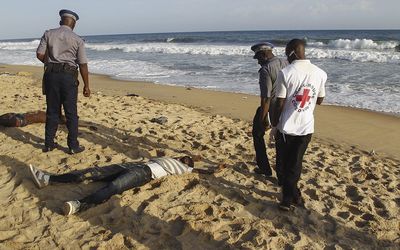Senegal’s resorts largely ignore threat of Islamist attacks
by Edward McAllister,
2016-03-16 12:11:47.0
SALY — Two days after al Qaeda gunman shot dead 18 people on a Côte d’Ivoire beach, tourists strolled nonchalantly down a similar stretch of sand in the Senegalese resort of Saly on Tuesday, browsing trinkets on sale and paddling in the Atlantic.
Even though the jihadist group’s Saharan wing, al-Qaeda in the Islamic Maghreb (AQIM), has made clear Senegal is in its sights because of its close ties to France, security was noticeable largely by its absence.
No police patrolled the beaches, a favourite weekend retreat 60km south of the capital, Dakar, and the only guards wandering around as hotel guests sat eating breakfast in the shade of palm trees were unarmed.
And yet a cloud now hangs over Saly and resorts across West Africa after the Côte d’Ivoire attack, which marked a change in tactics by AQIM, whose militants have in the last four months hit large hotels and restaurants in Bamako and Ouagadougou, the capitals of Mali and Burkina Faso respectively.
Côte d’Ivoire, the largest economy in Francophone West Africa and the world’s top exporter of cocoa, was already on high alert, knowing it was a target for Islamist militants keen to expand their reach beyond the Sahara and Sahel.
Elite Ivorian troops had run a simulation of just such an incident only ten days ago, according to Control Risks, a global security consultancy.
But when four gunmen hit the quiet town of Grand Bassam, it took elite troops 45 minutes to arrive and local security guards were powerless to stop the killing.
Those in Saly are only just realising how serious the threat is.
"We are not ready for an attack," said Papisse Thiam, who guards the gated entrance to a beachside compound frequented by Westerners. One unarmed person sits at the gate in the day, and five at night, he said.
"The people talk about it but they aren’t afraid." Locals said security has increased over the past year, and there were a few security guards on Saly’s busy main strip, one block back from the beach. But they were unarmed and some appeared to be on traffic duty.
The Lamantin Beach Hotel, a sprawling upmarket complex favoured by Europeans, added armed guards and introduced vehicle searches in November after attacks in Paris by Islamic State (IS) gunmen killed 130 people.
But the security only covers the hotel grounds and does not affect the rest of town.
"Everyone pays attention but it is difficult to be prepared for an attack," said Fatou Fall, a manager at Lamantin. "The menace is real. We cross our fingers and hope," she said.
Many holiday-makers were confident of their safety.
"It’s a bit worrying, but there is no problem," said Ramera, a French tourist. "We don’t want soldiers"
Despite political upheaval and civil wars across the region, West Africa has experienced few of the targeted attacks now being launched routinely by AQIM, which experts say is flexing its muscles to ward off encroachment from IS militants.
Experts worry that despite international assistance, particularly from France and the US, regional co-operation and intelligence gathering are too weak to catch the spread of militancy or halt attack plans.
Moreover, the isolation of smaller beach towns makes reacting to an attack harder.
"While these states may be on alert, their counterterrorism capability is below par," said Andre Colling, chief lead analyst at crisis management assistance company red24.
"A committed assault against what is supposed to be a well-secured high-value target can be achieved fairly simply.
States in the region simply don’t have the resources to deal with this threat and we should expect more." Yet many in Saly remain unfazed. Yaunick Le Moal, who owns Hotel Les Flamboyants on its main strip, laughed off the threat, saying the French cities of Paris or Marseilles were far more dangerous.
Damien Trilles, who runs a beach bar frequented by French and Belgians, was equally unconcerned, hoping mainly that the perception of danger would not keep people away. Tourism has only just recovered from the Ebola virus outbreak, he said.
"People are coming back, but it is fragile," he said. "We don’t want soldiers patrolling the beach with guns and helmets."
Reuters

Ivorian policemen and medical personel look at the bodies of people killed on the beach infront of the Etoile du Sud hotel in Grand Bassam, Ivory Coast 13 March 2016. Picture: EPA/LEGNAN KOULA
SALY — Two days after al Qaeda gunman shot dead 18 people on a Côte d’Ivoire beach, tourists strolled nonchalantly down a similar stretch of sand in the Senegalese resort of Saly on Tuesday, browsing trinkets on sale and paddling in the Atlantic.
Even though the jihadist group’s Saharan wing, al-Qaeda in the Islamic Maghreb (AQIM), has made clear Senegal is in its sights because of its close ties to France, security was noticeable largely by its absence.
No police patrolled the beaches, a favourite weekend retreat 60km south of the capital, Dakar, and the only guards wandering around as hotel guests sat eating breakfast in the shade of palm trees were unarmed.
And yet a cloud now hangs over Saly and resorts across West Africa after the Côte d’Ivoire attack, which marked a change in tactics by AQIM, whose militants have in the last four months hit large hotels and restaurants in Bamako and Ouagadougou, the capitals of Mali and Burkina Faso respectively.
Côte d’Ivoire, the largest economy in Francophone West Africa and the world’s top exporter of cocoa, was already on high alert, knowing it was a target for Islamist militants keen to expand their reach beyond the Sahara and Sahel.
Elite Ivorian troops had run a simulation of just such an incident only ten days ago, according to Control Risks, a global security consultancy.
But when four gunmen hit the quiet town of Grand Bassam, it took elite troops 45 minutes to arrive and local security guards were powerless to stop the killing.
Those in Saly are only just realising how serious the threat is.
"We are not ready for an attack," said Papisse Thiam, who guards the gated entrance to a beachside compound frequented by Westerners. One unarmed person sits at the gate in the day, and five at night, he said.
"The people talk about it but they aren’t afraid." Locals said security has increased over the past year, and there were a few security guards on Saly’s busy main strip, one block back from the beach. But they were unarmed and some appeared to be on traffic duty.
The Lamantin Beach Hotel, a sprawling upmarket complex favoured by Europeans, added armed guards and introduced vehicle searches in November after attacks in Paris by Islamic State (IS) gunmen killed 130 people.
But the security only covers the hotel grounds and does not affect the rest of town.
"Everyone pays attention but it is difficult to be prepared for an attack," said Fatou Fall, a manager at Lamantin. "The menace is real. We cross our fingers and hope," she said.
Many holiday-makers were confident of their safety.
"It’s a bit worrying, but there is no problem," said Ramera, a French tourist. "We don’t want soldiers"
Despite political upheaval and civil wars across the region, West Africa has experienced few of the targeted attacks now being launched routinely by AQIM, which experts say is flexing its muscles to ward off encroachment from IS militants.
Experts worry that despite international assistance, particularly from France and the US, regional co-operation and intelligence gathering are too weak to catch the spread of militancy or halt attack plans.
Moreover, the isolation of smaller beach towns makes reacting to an attack harder.
"While these states may be on alert, their counterterrorism capability is below par," said Andre Colling, chief lead analyst at crisis management assistance company red24.
"A committed assault against what is supposed to be a well-secured high-value target can be achieved fairly simply.
States in the region simply don’t have the resources to deal with this threat and we should expect more." Yet many in Saly remain unfazed. Yaunick Le Moal, who owns Hotel Les Flamboyants on its main strip, laughed off the threat, saying the French cities of Paris or Marseilles were far more dangerous.
Damien Trilles, who runs a beach bar frequented by French and Belgians, was equally unconcerned, hoping mainly that the perception of danger would not keep people away. Tourism has only just recovered from the Ebola virus outbreak, he said.
"People are coming back, but it is fragile," he said. "We don’t want soldiers patrolling the beach with guns and helmets."
Reuters




















Change: 1.19%
Change: 1.36%
Change: 2.19%
Change: 1.49%
Change: -0.77%
Data supplied by Profile Data
Change: -0.19%
Change: 0.69%
Change: 1.19%
Change: 0.00%
Change: 0.44%
Data supplied by Profile Data
Change: 0.62%
Change: 0.61%
Change: 0.23%
Change: 0.52%
Change: 0.12%
Data supplied by Profile Data
Change: -0.21%
Change: -1.22%
Change: -0.69%
Change: -0.51%
Change: 0.07%
Data supplied by Profile Data